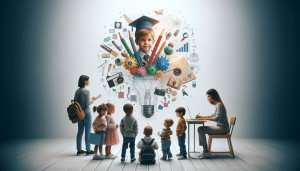Why Lifelong Learning Shapes You More Than You Think
Oliver Cooper September 29, 2025
Lifelong learning is more than a buzzword—it’s an investment in yourself, your adaptability, and your potential. Dive into the transformative world of ongoing education, explore why flexible learning options matter, and uncover how upskilling can benefit everyday life and society at large.
Lifelong Learning: Expanding Horizons Beyond School
The drive to keep learning doesn’t stop at graduation. In fact, lifelong learning is increasingly becoming essential in a rapidly evolving world. Flexible education formats make it possible for individuals to continuously expand their knowledge—whether through online courses, evening classes, or informal workshops. This mindset allows people from all walks of life to explore everything from advanced data analytics to creative arts, often while balancing work and personal responsibilities. Upskilling in this way equips people to meet shifting demands in the workplace, helps them stay relevant, and builds confidence to pursue fresh goals.
Many adults wonder why continuous education is so strongly encouraged by employers, governments, and universities. Research shows that workforce demands change often due to emerging technologies and economic shifts. By engaging in reskilling, adults can enhance their career mobility or even shift to entirely new industries. This connection between flexible education and employment opportunity is undeniable. For instance, micro-credentials and stackable certificates enable working adults to climb the career ladder while keeping other commitments. The ability to learn on your terms is a distinct advantage in a competitive job market.
Importantly, lifelong learning stretches beyond careers. It encompasses personal growth, mental agility, and civic participation. Community classes can boost interpersonal skills or teach financial literacy. Digital skills workshops offered at libraries and local centers lower barriers to technology. The cumulative effect? Lifelong learners often report higher self-worth, more resilience to change, and stronger engagement with their communities. By taking small, consistent steps, anyone can become an agile learner ready to tackle both everyday changes and major life events.
Flexible Education Paths: Adapting to Modern Needs
Education no longer takes place solely in traditional classrooms. Flexible learning options, such as online programs, blended courses, and micro-learning platforms, cater to individuals seeking accessible, customized education paths. This shift supports working professionals, caregivers, or rural residents who may not have access to universities nearby. These innovative formats open doors for everyone—students set their own pace and focus areas while fitting lessons around family and work.
Online platforms have propelled access to everything from introductory computer science courses to advanced vocational training. People can now pursue upskilling or even undertake transformative career changes from home. For example, reputable providers—such as edX or OpenLearn—offer high-quality, free and low-cost modules in areas like leadership, language skills, and public health. These platforms allow for flexible access that can be adjusted to match real-life schedules, further democratizing learning and narrowing skill gaps.
Even in K–12 and college settings, flexible learning is gaining ground. Flipped classrooms and hybrid models offer students more freedom and autonomy. Asynchronous lessons mean learners don’t have to abandon jobs or relocate to earn recognized qualifications. This approach also enables education institutions to engage students who have historically been marginalized or who need additional support. Flexibility isn’t just a convenience; it’s a key principle behind true educational inclusion.
The Power of Upskilling for Career Mobility
In this knowledge-driven economy, upskilling is not optional for most workers. Upskilling means gaining new knowledge and abilities within your field to stay effective, productive, and competitive. Many industries are evolving fast, and employers are prioritizing candidates who regularly pursue education—especially in fields like technology, healthcare, and finance. By taking advantage of workplace learning initiatives or seeking specialized certifications, employees demonstrate adaptability and motivation—traits often linked to career advancement.
Real-world examples illustrate the tangible benefits of continuous skill development. Consider the growing demand for digital literacy: companies often invest in in-house workshops on topics like artificial intelligence or data management. Many institutions partner with open-access resource platforms and community colleges to offer training—sometimes free—to prepare workers for new roles. This strategy not only helps bridge skills gaps but also prevents skill obsolescence, a leading concern among modern professionals.
For those aiming for promotion or career reinvention, upskilling provides more than technical skills. Communication, collaboration, and leadership are equally valued. Individuals who pursue a blend of hard and soft skills become more versatile and attractive to employers. In sum, upskilling is a tool for empowerment—one that fosters job security, confidence, and lifelong adaptability. Read more to see how learning can turn challenges into stepping stones for progress.
Social Benefits: Education’s Ripple Effect on Society
When people invest time and effort in flexible learning, the effects spread far beyond their personal circle. Education is linked to stronger civic engagement, reduced poverty rates, and greater political participation. Many societies find that increased skill levels in their population lead to more innovation and economic growth. For example, public libraries, nonprofit learning centers, and lifelong learning networks often serve as hubs that strengthen the fabric of whole communities.
Flexible education pathways help close opportunity gaps and empower underrepresented groups. Online and community-based initiatives provide accessible resources to learners from different socioeconomic backgrounds. These platforms also allow parents and caregivers to set positive examples for young people, while building critical skills themselves. The exchange of knowledge across generations bridges divides and fosters a culture of lifelong improvement and inclusivity.
And the good news keeps growing. Research suggests a direct connection between higher education levels and improved public health outcomes, reduced crime, and increased lifelong earnings. Community projects—such as mentorship programs and adult literacy classes—provide the scaffolding for stronger societies. In short, investing in flexible educational resources creates benefits that ripple outward, enhancing social well-being for all.
Learning Online: Exploring Modern Tools and Resources
The boom in online learning tools has revolutionized the way people engage with education. From massive open online courses (MOOCs) to mobile learning apps, there’s an option for almost any learning style. Teachers and students are discovering interactive technologies like forums, video conferencing, and adaptive quizzes that keep engagement high. This accessibility allows for deeper subject exploration and helps learners retain information more effectively.
Open educational resources (OER) break down barriers to knowledge by providing free, high-quality materials for self-directed learners. Universities and nonprofit organizations routinely upload video lectures, textbooks, and assessment tools for public use. This movement has grown beyond higher education—professional organizations and government agencies offer open resources for lifelong learning. The only requirement is curiosity and a willingness to try something new.
Online micro-credentials, digital badges, and competency-based programs add another layer of value. They validate learning outcomes and offer proof of skills for employers or other educational institutions. Flexible timelines mean learners can progress at their pace, even from remote or rural areas. This new flexibility boosts confidence and gives people the autonomy to pursue passions and build rewarding careers—all from their home computer or mobile device.
Building Habits for Lifelong Learning Success
Sustainable lifelong learning starts with mindset. Developing curiosity, setting achievable goals, and regularly reflecting on progress are foundational habits. People who see learning as a journey—rather than a destination—tend to experience greater personal and professional growth. Staying organized and using goal-tracking tools can ensure steady progress, while peer groups or mentors help sustain motivation during challenging phases.
Taking advantage of learning communities can make the process more engaging. Virtual study groups, forums, or in-person workshops provide accountability and support. Many organizations and adult education centers offer guided programs that include feedback from instructors, peer collaboration, and community events. These models turn education into a social activity—transforming solo efforts into collective advancement, which leads to higher rates of course completion and satisfaction.
Finally, celebrating milestones—no matter how small—fuels momentum. Recognizing progress inspires further learning and turns education into a habit. Whether finishing a new course, mastering a skill, or simply reading a challenging book, every achievement counts. This approach helps learners build resilience, adapt to new situations, and thrive in different stages of life, ensuring that growth never truly stops.
References
1. Organisation for Economic Co-operation and Development. (n.d.). The importance of lifelong learning. Retrieved from https://www.oecd.org/education/skills-beyond-school/
2. UNESCO Institute for Lifelong Learning. (2022). Benefits of lifelong learning. Retrieved from https://uil.unesco.org/lifelong-learning/benefits-lifelong-learning
3. EdX. (n.d.). Micro-credentials and upskilling explained. Retrieved from https://www.edx.org/learn/microcredentials
4. U.S. Department of Education, Office of Educational Technology. (n.d.). Reimagining the role of technology in education. Retrieved from https://tech.ed.gov/netp/
5. National Center for Education Statistics. (2021). Adult learning and education. Retrieved from https://nces.ed.gov/pubs2021/2021352.pdf
6. OpenLearn. (n.d.). Flexible learning. Retrieved from https://www.open.edu/openlearn/education-development/flexible-learning/content-section-0?active-tab=description-tab







